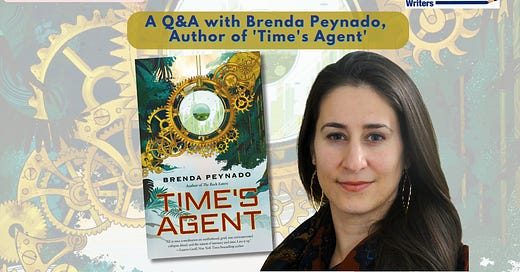Brenda Peynado’s Time’s Agent is a sci-fi novel set in a near-future Santo Domingo, where the discovery of pocket worlds reveals hidden dimensions of our reality and where time flows at different speeds. Some pocket worlds can be as big as a town, others as small as a purse.
These newly uncovered worlds within our own offer limitless possibilities not only for our future, but also for our past. Agent Raquel Petra dreamed of uncovering a lost tribe of Tainos, while her wife, biologist Marlena, was captivated by the unique flora and fauna that evolved parallel to our world. The couple’s professional passions underscore the novel’s exploration of human curiosity and the drive to connect with lost histories and untouched environments.
Call it an accident or carelessness, but Raquel's life shattered the moment she touched that pocket world, losing 40 years of relative time on standard Earth. She returned to a world ravaged by war, corporate greed, climate change, and the loss of her daughter. Marlena, overwhelmed by grief, retreated into the pocket world hanging from Raquel’s neck, seeking solace in the distorted flow of time as she grappled with the enormity of her loss.
Time’s Agent paints a futuristic Santo Domingo where drones deliver fruits, and headlinks replace smart devices. Yet, alongside these technological advancements, the novel confronts the very real issues plaguing today’s society—social inequality, environmental destruction, and the exploitation of resources. At its heart, Time’s Agent is a story of grief, exploring how a queer couple copes with loss in a world where escape is a tangible possibility. As in many of Peynado’s short works, she skillfully tugs at our heartstrings, drawing us into the characters' emotional depths before thrusting them into heart-pounding, imminent danger.
Chapter One places Raquel in the middle of the story, where much of the plot has already unfolded. This chapter is crucial not only for understanding the unfolding events but also for appreciating Peynado’s storytelling approach. The subsequent chapters then recount the story chronologically, revisiting points from the first chapter and leaving the reader with a sense of satisfaction that’s rare in contemporary novels. This nonlinear approach mirrors the disorienting effects of time within the pocket worlds, effectively immersing the reader in Raquel’s fragmented reality.
The novel’s strengths lie in its rawness. Peynado doesn't shy away from addressing difficult topics that afflict both our world and our comunidad. The narrative delves into issues like homophobia, colorism, and racism, while portraying the struggles of a couple grappling with the death of their daughter, Raquel's guilt, and the emotional barriers erected by Marlena, the biological parent, who holds Raquel responsible.








Share this post